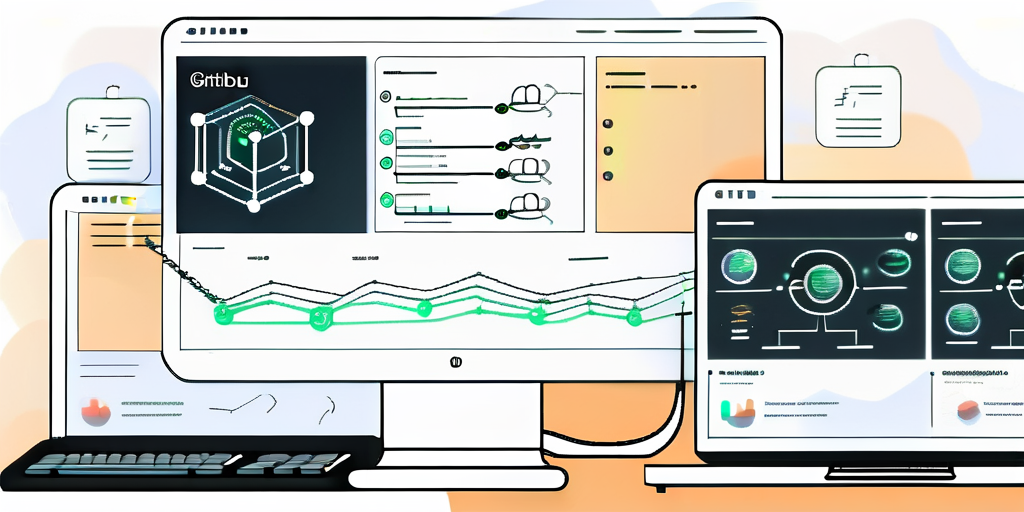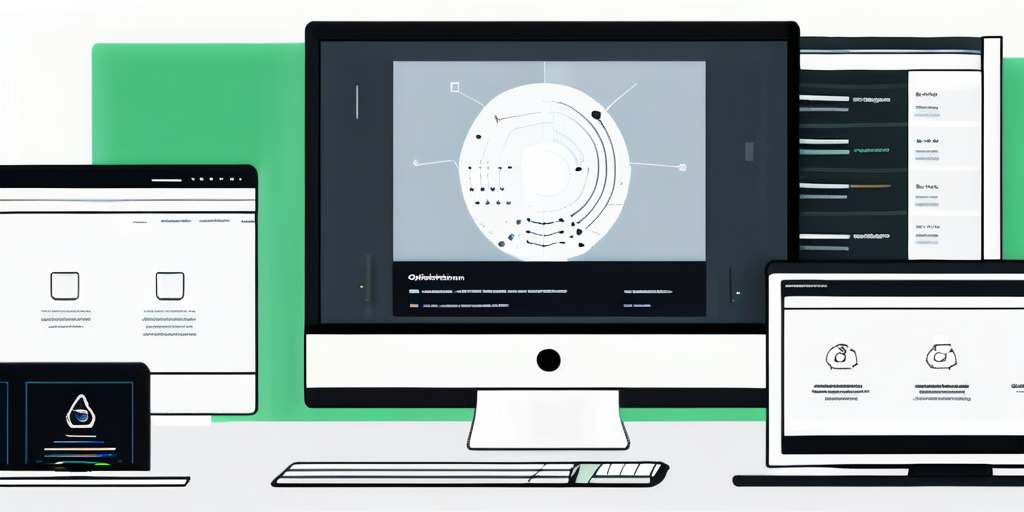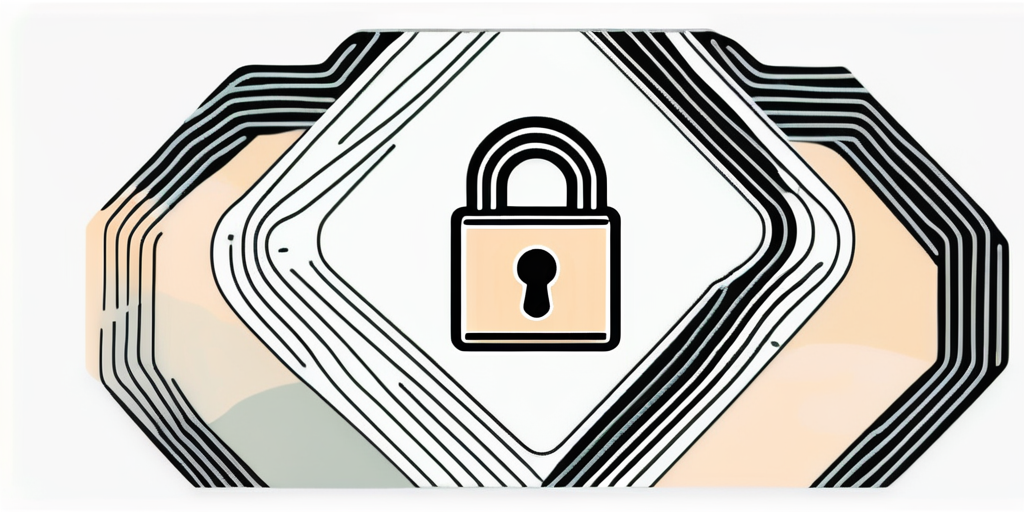
GitHub has become an essential platform for software developers, revolutionizing the way they collaborate, showcase their work, and establish their professional presence. In this article, we will explore the importance of GitHub for software developers and delve into the various aspects of creating and maintaining an impressive GitHub profile.
Understanding the Importance of GitHub for Software Developers
GitHub plays a crucial role in software development due to its immense benefits. Firstly, it serves as a central hub for version control, allowing developers to track changes, collaborate seamlessly, and ensure a smooth workflow. With version control, developers can easily revert to previous versions of their code, making it easier to fix bugs and implement new features without the fear of losing progress.

Additionally, GitHub enables developers to showcase their coding skills, projects, and contributions, acting as an online portfolio that potential employers and clients can assess for their talent and expertise. By hosting their code on GitHub, developers can provide concrete evidence of their abilities, making it easier for recruiters and collaborators to evaluate their proficiency.
Moreover, GitHub has emerged as a community-driven platform, fostering collaboration and knowledge sharing among developers worldwide. By contributing to open-source projects, developers can gain valuable experience, expand their network, and enhance their professional reputation. Open-source projects on GitHub provide developers with the opportunity to work on real-world applications, collaborate with experienced developers, and learn from their peers.
The Role of GitHub in Software Development
GitHub significantly aids in streamlining the software development process. It facilitates efficient teamwork by enabling developers to work on different branches, merge their changes, and resolve conflicts efficiently. With GitHub’s comprehensive project management tools like issue tracking, project boards, and task automation, developers can effectively plan, prioritize, and execute their projects.
Furthermore, GitHub provides a platform for code reviews, allowing developers to receive feedback from their peers and improve the quality of their code. By leveraging the power of pull requests, developers can collaborate on code changes, discuss implementation details, and ensure that the final product meets the highest standards.
Moreover, GitHub’s integration with popular development tools, such as continuous integration and deployment services, further enhances the software development process. With these integrations, developers can automate the testing and deployment of their applications, ensuring that they are always up-to-date and functioning correctly.
Why Your GitHub Profile Matters
Your GitHub profile serves as an authentic representation of your programming skills and experience. Potential employers and collaborators often rely on GitHub to gauge your expertise and assess the quality of your code. Therefore, maintaining an impressive and up-to-date profile is essential to leaving a positive impression on recruiters and attracting meaningful opportunities.
Furthermore, your GitHub profile portrays your coding style and problem-solving abilities. It demonstrates the breadth and depth of your projects, showcasing your ability to develop robust applications and solve real-world challenges. A well-curated GitHub profile can open doors to exciting job prospects and collaborations with like-minded developers.
Additionally, GitHub provides a platform for developers to build their personal brand. By actively contributing to open-source projects, sharing insights through blog posts, and participating in discussions, developers can establish themselves as experts in their field. This can lead to speaking engagements, consulting opportunities, and invitations to join prestigious organizations.
In conclusion, GitHub is an invaluable tool for software developers. It not only simplifies the version control process but also provides a platform for collaboration, learning, and showcasing one’s skills. By leveraging the power of GitHub, developers can enhance their professional reputation, attract meaningful opportunities, and contribute to the growth of the global developer community.
Deciding What to Put on GitHub
While the concept of maintaining a GitHub profile may seem straightforward, choosing which projects to showcase can be a daunting task. It’s important to select projects that highlight your skills and align with your professional goals. Let’s explore some factors to consider when evaluating your projects for GitHub.

When deciding what to include on GitHub, it’s crucial to think about the impact and relevance of your projects. Consider the potential value they can bring to others in the developer community. Are they solving common problems or addressing emerging trends? Projects that demonstrate innovation and creativity will capture the attention of prospective employers and collaborators.
Begin by assessing the complexity and relevance of your projects. Identify projects that demonstrate your proficiency in different programming languages, frameworks, or technologies. The diversity of your projects will showcase your versatility and adaptability as a developer. It’s important to strike a balance between showcasing your expertise in specific areas and demonstrating your ability to learn and work with new technologies.
Consider emphasizing projects that reflect your expertise in popular and trending technologies. Prospective employers and collaborators often search for developers with experience in specific technologies, making it crucial to showcase your knowledge and proficiency in the most sought-after areas. Highlighting your experience with technologies such as machine learning, cloud computing, or mobile app development can significantly enhance your GitHub profile.
Evaluating Your Projects for GitHub
When evaluating your projects for GitHub, it’s essential to consider the impact and scalability of your work. Projects that have gained traction within the developer community or have been recognized by industry experts can add significant value to your profile. If you have received positive feedback or contributions from other developers, it’s worth highlighting these achievements.
Furthermore, consider the potential for collaboration and contribution. Open-source projects or projects that encourage community involvement can demonstrate your ability to work effectively in a team and your commitment to advancing the field. Highlighting projects that have received contributions from other developers can showcase your ability to build and maintain collaborative relationships.
The Dos and Don’ts of GitHub Content
When deciding what to include on GitHub, it’s important to adhere to certain best practices. Firstly, ensure that your projects are well-documented, providing clear instructions on setup, usage, and any dependencies. This helps prospective users understand and utilize your projects effectively. A comprehensive README file, along with inline comments within the code, can greatly enhance the usability of your projects.
Additionally, strive for code cleanliness and readability. Employ proper coding conventions, meaningful variable names, and thorough comments to make your projects easily understandable. Clear, concise, and well-documented code exhibits your professionalism and attention to detail. It also makes it easier for others to contribute to your projects or learn from your code.
However, it’s equally important to avoid cluttering your GitHub profile with unfinished or low-quality projects. Refrain from uploading code that you’re not proud of or that does not reflect your current capabilities. Quality prevails over quantity when it comes to showcasing your work. Focus on presenting a curated selection of projects that truly represent your skills and expertise.
Lastly, don’t forget to regularly update your GitHub profile with new projects or improvements to existing ones. This shows your commitment to continuous learning and growth as a developer. It also keeps your profile fresh and engaging for visitors.
How to Organize Your GitHub Repository
Now that you’ve decided which projects to showcase on GitHub, it’s crucial to organize your repository effectively. A well-structured repository enhances the accessibility and discoverability of your projects, making it easier for others to navigate and understand your code.
When it comes to structuring your GitHub repository, there are several best practices to consider. One approach is to organize your repository into logical directories or folders, each representing a separate project or module. This hierarchical organization allows for easy navigation and ensures that your codebase remains manageable as projects grow.
For example, let’s say you have a repository dedicated to web development. You can create separate directories for frontend and backend projects, as well as additional directories for any libraries or frameworks you may be using. This way, anyone visiting your repository can quickly find the specific project they’re interested in.
It’s also important to include a README file in each directory. The README should provide an overview of the project’s purpose, installation instructions, and usage examples. This documentation helps others understand your code and encourages collaboration and contribution.
In addition to organizing your code, it’s essential to include relevant files in the appropriate directories. This might include licenses, documentation, and configuration files. By providing a comprehensive package, you make it easier for users who wish to explore or contribute to your projects.
Tips for Effective Repository Management
Once you have your repository structured, it’s important to regularly update it to reflect your latest projects and enhancements. Keeping your README files up-to-date is crucial, as they serve as a guide for users and potential contributors. Make sure your README reflects the current state of your projects and includes any relevant changes or improvements.
Engaging with the GitHub community is another key aspect of effective repository management. Actively participating in discussions, reviewing pull requests, and providing meaningful feedback not only helps you improve your projects but also establishes your presence within the developer community. Collaboration and community involvement are highly regarded among developers and can contribute significantly to your professional growth.
Lastly, consider adding a license to your repositories. Licensing your code protects your work and establishes clear usage guidelines. Open-source licenses, such as the MIT License or the GNU General Public License, allow others to use, modify, and distribute your code while maintaining appropriate attribution and licensing requirements. Choosing the right license for your projects is an important decision, so be sure to research and understand the implications of each license before making a choice.
Enhancing Your GitHub Profile

While the projects and repositories are the core of your GitHub presence, additional elements can further enhance your profile and make it stand out. Let’s explore some strategies for boosting the impact of your GitHub profile.
Writing a Strong GitHub Bio
Your GitHub bio provides a brief introduction to your background, expertise, and interests. Craft a concise and engaging bio, emphasizing your key skills, experiences, and achievements to grab the attention of potential collaborators or employers. Highlight any notable contributions to open-source projects or any awards or certifications you have received.
For example, if you have contributed to a popular open-source project, mention the impact of your contributions and how they have benefited the community. This will demonstrate your ability to work collaboratively and showcase your technical skills.
Furthermore, consider adding a personal touch to your bio by mentioning any hobbies or interests related to coding. This can help potential collaborators or employers connect with you on a more personal level and make your profile more memorable.
Utilizing GitHub’s Features to Your Advantage
GitHub offers various features and tools that can add depth and interactivity to your profile. Take advantage of the Projects feature to showcase ongoing or upcoming projects and provide a visual representation of your progress.
When using the Projects feature, consider providing detailed descriptions of each project, including the technologies used, the problem it solves, and any challenges you faced during development. This will give visitors a better understanding of your skills and expertise.
Additionally, leverage GitHub Pages to create a personal website or blog, further showcasing your coding abilities and knowledge in a dedicated space. With GitHub Pages, you can create a professional-looking website to showcase your portfolio, share your thoughts on coding-related topics, or even document your learning journey.
Consider adding a blog section to your GitHub Pages website where you can write about your experiences, insights, and lessons learned from your projects. This will not only demonstrate your technical skills but also your ability to articulate your thoughts and share knowledge with others.
Furthermore, GitHub offers the option to pin repositories to your profile, allowing you to highlight your most impressive or relevant projects. Take advantage of this feature by selecting projects that showcase your diverse skill set or demonstrate your expertise in a particular programming language or framework.
Remember to regularly update your profile with new projects, contributions, or achievements to keep it fresh and engaging. This will show that you are an active and dedicated developer, always seeking new challenges and opportunities.
Protecting Your Work on GitHub
With your GitHub profile and projects in the spotlight, it is crucial to protect your code and intellectual property. GitHub provides several security features that play a vital role in safeguarding your work from unauthorized access or malicious use.

Understanding GitHub’s Security Features
GitHub offers features such as two-factor authentication (2FA), access control, and security alerts to enhance the security of your repositories. Enabling 2FA adds an extra layer of protection to your account, thwarting unauthorized access even if your password is compromised.
Additionally, GitHub’s access control feature allows you to manage collaborators and control their level of access to your repositories. Choose between read-only access, allowing others to view and clone your code, or provide write access to collaborators you trust.
Best Practices for Protecting Your Code
While GitHub provides robust security features, it is essential to follow best practices to safeguard your code further. Ensure that you do not inadvertently commit sensitive information, such as API keys or credentials, into your repositories. Use environment variables or other secure storage methods to manage such confidential information.
Regularly review the security settings of your repositories and account, staying informed about any security updates or vulnerabilities. Additionally, consider using strong, unique passwords and regularly updating them to minimize the risk of unauthorized access.
In conclusion, software developers should leverage the power of GitHub to establish their professional presence, collaborate effectively, and showcase their coding prowess. By understanding the importance of GitHub, selecting the right projects, organizing repositories thoughtfully, and enhancing their profile, developers can create a compelling GitHub presence that attracts meaningful opportunities. Moreover, by employing GitHub’s security features and following best practices, developers can ensure the protection of their valuable code and intellectual property. Embrace GitHub, and let your passion for coding leave a lasting impression on the vibrant developer community.